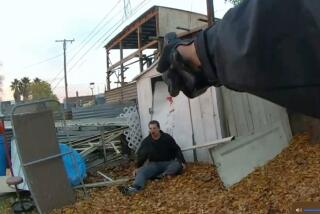Widow of Inmate to Get Pension : Courts: County settles suit brought in death of man who suffered blood clot after six days in restraints. About $400,000 is involved, lawyer says.
- Share via
Los Angeles County will provide a lifetime pension to the widow of a man who died from a blood clot after he was strapped to a cot in the County Jail psychiatric ward for six days, the widow’s attorney said Friday.
Carl Bruaw, a 49-year-old Northridge real estate agent serving a one-year sentence for misdemeanor assault, suffered a fatal blood clot in a lung July 3, 1989, after spending six days in restraints binding his wrists and ankles.
He had been placed in the mental observation unit because he was babbling and could not respond to instructions, according to medical records.
Bruaw’s widow sued the county, seeking unspecified damages for his death and prompting state and county investigations, both of which concluded that the jail medical staff violated accepted medical practices for the use of restraints. A federal investigation is under way.
R. Samuel Paz, attorney for Joyce Amiri, the widow, said she will receive a damage award and lifetime pension that he valued “in the neighborhood of $400,000.” He said the settlement is based on estimates of how much Bruaw would have earned if he had lived.
Paz described the settlement as a “clear admission of negligence on the part of the county.” He said he could not reveal details because county lawyers insisted on a non-disclosure clause as part of the settlement.
County attorneys confirmed that the case had been settled but refused to provide details, citing the non-disclosure clause. Donna Bruce, an attorney representing the county, said the non-disclosure clause is “standard in these types of cases.”
After Bruaw was strapped to the cot in the psychiatric observation ward June 27, 1989, Paz said, the jail medical staff ignored state and federal requirements that the decision to use restraints be re-evaluated every two hours, and that Bruaw be allowed to move his limbs for 10 minutes every two hours. Medical experts said prolonged immobility can cause blood clots in the lungs.
“To strap him down in an observation area to watch him for six days was just ridiculous. They should have immediately gotten him to the hospital,” Paz said. “He was just ignored. He was dying and nobody thought much about ‘This is a human being.’ ”
William Kern, director of medical services for the jail, refused to comment on the case, the policies governing the use of restraints in the jail or any aspect of the health-care system in the jail.
The FBI has concluded an inquiry into Bruaw’s death, and the case is being reviewed by the U.S. attorney’s office, which will decide whether criminal prosecution or other legal action is warranted.
Spokesmen for the FBI and Justice Department declined to comment on the findings of the investigation.
The state Department of Health investigation into Bruaw’s death and another patient complaint concluded that the jail--which provides medical care for about 7,000 prisoners every day--failed to follow medically acceptable practices in 11 other areas of patient care.
These included taking precautions to prevent the spread of infection; disposing of dressings, syringes and other medical wastes, and providing ways for patients in distress to summon medical help.
Paul Keller, the Department of Health official who oversees hospital licensing for Southern California, said state officials did not take punitive action against the Sheriff’s Department, which runs the jail.
“The presumption has got to be that they were trying to do the right thing and that once it was brought to their attention they would correct it,” Keller said.
More to Read
Sign up for Essential California
The most important California stories and recommendations in your inbox every morning.
You may occasionally receive promotional content from the Los Angeles Times.













